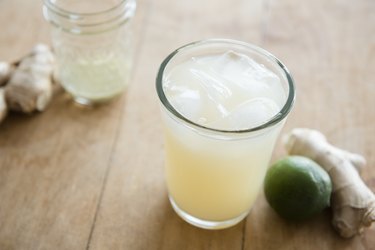
The next time someone offers you a ginger ale for your upset stomach, you may have to opt for ginger instead. Canada Dry ginger ale benefits are few, as ginger ale is considered an artificially sweetened beverage with little to no nutritional value.
Ginger Ale Benefits
Video of the Day
Despite widely held beliefs that ginger ale can soothe an upset stomach or curb nausea, the truth is that the sugary drink doesn't have any benefits or nutritional value. The health benefits of ginger, on the other hand are abundant. Though you won't find actual ginger in ginger ale, you will find it in a good ginger ale alternative: ginger beer.
Video of the Day
So what are these health benefits of ginger? According to the University of Rochester health encyclopedia, ginger is generally used to treat an upset stomach or reduce nausea, particularly pregnancy-related nausea, such as morning sickness.
According to a March 2011 article in Herbal Medicine: Biomolecular and Clinical Aspects, ginger also contains antioxidant properties and some research has indicated that it may have anti-inflammatory effects as well. It's also been studied for its anticarcinogenic and other disease-preventative features.
Read more: Ginger Water Benefits
Ginger Ale Side Effects
So, is ginger ale good for you? Put simply, not exactly. As a sugary drink, ginger ale contains many calories, 135 in a 12-ounce serving to be exact, says MedlinePlus.
Sugary drinks will not only cause weight gain, but increase the risk of heart disease, other chronic diseases and type 2 diabetes, says the Harvard School of Public Health. In fact, people who consume sugary drinks one to two times a day, have a 26 percent greater chance of developing type 2 diabetes than non-soda-drinkers.
Furthermore, According to Harvard School of Public Health, regularly drinking sugary drinks can increase your chance of developing gout, compromise healthy bones and in some severe cases, lead to premature death.
A March 2019 study in Circulation found that consumption of sugar-sweetened beverages was associated with a higher risk of mortality from cardiovascular disease. Another study from May 2017 in Stroke, found that sugary and artificially sweetened beverages could increase the risk of stroke and dementia.
Read more: The Top 10 Worst Soft Drinks for Your Health
Alternatives to Ginger Ale
Centers for Disease Control and Prevention has a few tips for avoiding sugary drinks, such as ginger ale, and making better beverage choices.
Tips include, choosing water or low-calorie beverages over sugary drinks, making sure not to stock the refrigerator with soda and other sugar-filled beverages, adding flavor like lemon, watermelon or lime to sparkling water and opting for a small size if you do choose to get a sweetened beverage. Keep in mind that ginger ale contains 135 calories in a 12-ounce cup, while water contains zero calories.
Diet sodas that are replaced with low-calorie artificial sweeteners, are not necessarily healthier, says Harvard School of Public Health. There needs to be further research to study its effects, and whether low-calorie sweeteners can, in fact, be detrimental.
Another ginger ale replacement you can try, as mentioned earlier, is ginger beer. Ginger beer is similar in taste to ginger ale, though it actually contains ginger, which means it comes with a number of health benefits, such as alleviating an upset stomach or nausea.
- CDC: "Rethink Your Drink"
- Harvard School of Public Health: "Sugary Drinks"
- MedlinePlus: "Calorie Count: Sodas and Energy Drinks"
- Stroke: "Sugar- and Artificially-Sweetened Beverages and the Risks of Incident Stroke and Dementia: A Prospective Cohort Study"
- University of Rochester Medical Center: "Ginger"
- Herbal Medicine: Biomolecular and Clinical Aspects: "The Amazing and Mighty Ginger"
- Circulation: "Long-Term Consumption of Sugar-Sweetened and Artificially Sweetened Beverages and Risk of Mortality in US Adults"
- Harvard Medical School: Are Artificial Sweeteners Safe?
- University of Maryland Medical Center: Phenylalanine